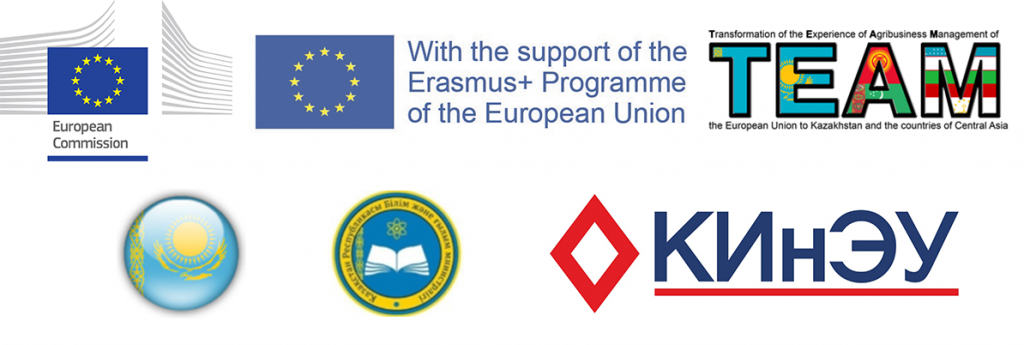
Implementation of the Jean Monnet module project «Transformation of the experience of agribusiness management of the European Union to Kazakhstan and the countries of Central Asia»
In the address to the people of Kazakhstan “New opportunities for the development of the fourth industrial revolution”, the President of the Republic of Kazakhstan N.A. Nazarbayev said: “Today the world is entering the era of the fourth industrial revolution, a phase of profound and intensive changes in the technological, economic and social spheres.” Therefore, our goal is to create values that correspond to the message of the president, which open up great opportunities and initiatives for our young people in today’s competitive world.
The implementation of the Jean Monet module project “Transformation of the experience of agribusiness management of the European Union to Kazakhstan and the countries of Central Asia” has been carried out since 2018 and is the beginning of the implementation of our goals regarding the fourth industrial revolution.
Jean Monnet’s program aims to extension of knowledge of European integration processes through teaching, research and debates on topics related to history, politics, economics and legislation of the European Union, as well as EU relations with other regions of the world. The main objective of the program is to bring the European dimension to higher education systems. Namely, in the current project – updating the curriculum, disseminating advanced knowledge and improving practice in the agro-industrial complex.
The aims of the project «Transformation of the experience of agribusiness management of the European Union to Kazakhstan and the countries of Central Asia»:
– integration of European education and creation of a pole of European knowledge in the northern region of Kazakhstan;
– promotion of best practices in the field of teaching and research on agricultural policy of the European Union, agribusiness for adaptation in Kazakhstan and Central Asian countries;
– development of dialogue between the academic world and the sphere of public administration in order to improve the state agrarian policy;
– identification of areas of global research to address problems and opportunities equally relevant for the European Union and Central Asian countries;
– enhanced cooperation.
The project “Transformation of the experience of agribusiness management of the European Union to Kazakhstan and the countries of Central Asia” provides for the implementation of the following activities:
1. Introduction of a new official training course for undergraduate students (30 second year students, 2nd semester). In total, 90 students will be trained during the project.
2. In addition to KEEU students, it is planned to involve students of Central Asian universities in open lectures using a virtual platform on an optional basis. The use of technology 12 virtual classrooms (Adobe Connect for up to 100 users) will involve teaching students from partner universities KEEU in the countries of Central Asia.
3. Conducting an international scientific and practical conference with the participation of representatives of universities in Central Asia (CA), agrarians – practitioners, scientists, representatives of state regional government bodies, representatives of the public, faculty, students, and researchers. The total number of participants is planned to be 200 people.
4. Studies on issues related to the EU. It is planned to carry out 3 studies on topics related to EU issues. They will reveal the experience of the EU agribusiness development, the analysis of adaptation to the agrarian policy of Kazakhstan.
5. The organization of debates in the format of “Round table” provides for the involvement of farmers, members of the public, and representatives of regional government structures in the agrarian sphere, in the field of education, internal policy and youth policy. In total, the number of participants in the debate is planned to be 100 people.
6. Publications and dissemination of project materials.
This project has been funded with the support of the European Commission. The contents of this publication/material are the responsibility of the author and do not reflect the views of the European Commission.